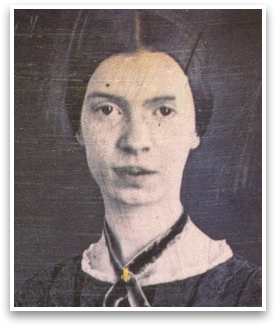
Emily Dickinson
Often remembered as much for her personal uniqueness as she is for her poetry, Emily Dickinson was a young woman of deep complexity and seeming contradictions. She refused to verbally declare her faith, yet her poems often reflect a deep desire to engage the Divine. She was noted for her quiet reclusiveness, yet she thought much of Love and the power it holds over us.
Unlike many of her contemporaries, her poetry contains no social or political topics. Instead, she chose to wrestle with matters of deep personal significance to her and to everyone, from death and suffering, to love and God.

Themes and Facts
- She was raised in a strict home, the daughter of Edward, a lawyer and congressman, and Emily Norcross Dickinson
- Dickinson attended Amherst Academy and generally took well to her studies. She also attended Mount Holyoke Female Seminary and was less satisfied with the forced religious devotion required of the students.
- The nineteenth century fascination with science and the importance of close observation was highly influential to young Dickinson.
- Though critical of so-called organized religion, much of Dickinson's poetry reflects a deep, if not at times irreverent, faith.
- Dickinson was very well read, particularly enjoying the work of Emerson.
- Although she often seemed ill-at-ease with other's company, Dickinson was known for her sense of humor and childlike playfulness at times.
Study Questions
- What is the significance of Dickinson's non-standard punctuation usage?
- Dickinson is often noted for her seclusion (possible self-inflicted) from society. Where do you see evidence of this in her poetry?
- Where do you see evidence of her supposed humor and playfulness in Dickinson's poetry?
- Dickinson did not become a recognized poet until after her death. Based on the subjects and/or style of her poetry, why would she not want her poetry to be more well known?
A fascinating figure often more studied for her biography than her poetry, Emily Dickinson left behind a broad body of work that explored the tension between faith and doubt as well as such themes as pain, suffering, love, death, and nature. Her style captures her love of language in its playfulness and careful deliberation.